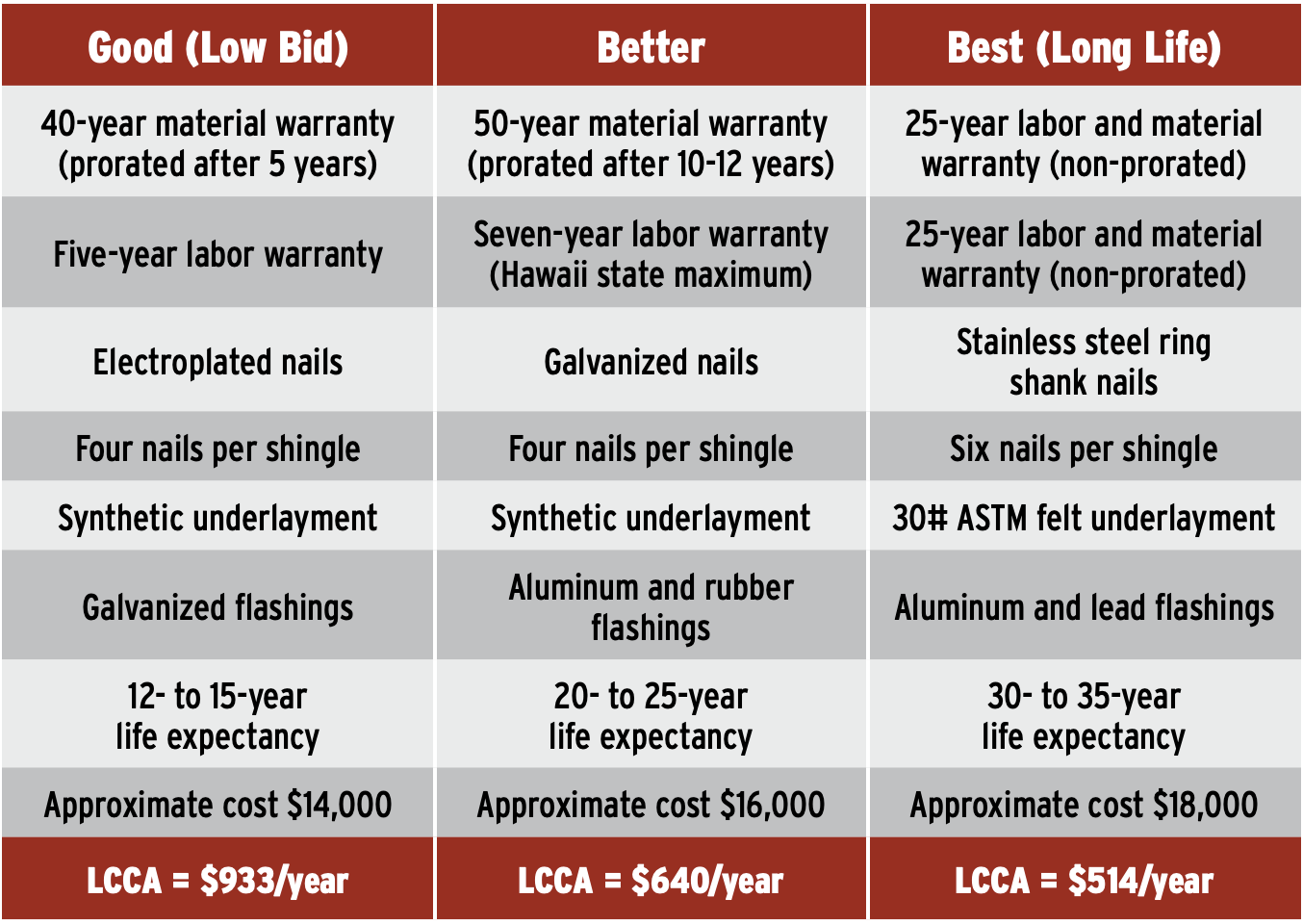The lowest roofing bid may not be the best deal
Life-cycle cost analysis (LCCA) sounds like a complicated term but it is actually a “Business 101” concept. Any property manager or owner should be familiar with the concept of life-cycle costing.
A simple example: A property owner makes the decision to get a loan to install a $30,000 photovoltaic rooftop system. The upfront cost is large, but the system pays for itself in the first five years if the existing electric bill is $500 a month. For the next 15 years of the warrantied installation, the owner receives virtually free electricity ($500 a month for five years equals $30,000). Spread out over 20 years, the LCCA is $125 a month.
Photovoltaic systems should be installed on newer roofs that will outlive the 20-year warranty of the new PV system. Roofing should also be looked at from a life-cycle costing perspective. Example: three roofing contractors provide proposals to reroof a structure with asphalt shingles (3,000 square feet).
At first glance, the low “good” bid looks enticing, but in fact the owner will have to re-roof about 20 years sooner than the “best” bid option. By the time the quality-installed roof reaches its 35-year life expectancy, the low-bid roof will already be well into its second re-roofing. A quick life-cycle costing analysis would provide the property owner with this knowledge. The term “quality roofing” is quantified by asking the manufacturer which roofers in your area are qualified to install long-term and non-prorated labor and material warranty installations of their product.
When approaching construction projects with the LCCA method, always
start by calling and talking to the manufacturer’s representative and asking them for referrals for “certified installers” in your area. Certified installers are the quality installers. Quality installers are the contractors who take the time and care to meet the specifications of the manufacturer’s demands without taking shortcuts and can provide the long-term non-prorated warranties that cover both labor and material up to 25 (or more) years.
Insisting on using a roofer who is certified and able to provide owners with a long-term labor and material warranty with the installation is the best way to ensure that owners will receive a quality installation with a long-term life expectancy, even if the owner doesn’t opt for the cost of a long-term labor and material warranty. That’s one of the tricks smart property managers and owners use when choosing a certified installer for a construction project. You get the quality install without paying the warranty fee. It’s win-win.
Whether you’re installing rolled cap sheet or silicone on a low-slope roof or asphalt shingle, cedar shake or metal standing seam, each material can be installed in a “cost-effective” manner or in a quality manner. “Cost-effective” usually means cheaper materials and installation practices.
A lot of manufacturers certify their best installers and provide them with certification badges. These badges let customers know that their contractor is in good standing with the material manufacturers and that they will receive a quality install.
Quality installs might come with a higher upfront price tag, but when they outperform and outlast the cheap bids by a magnitude of decades, you’ll realize that the life-cycle cost is actually less costly over the long run because the roof simply lasts longer. The takeaway here is that owners should choose certified material installers whether or not the owner opts for the long-term manufacturer’s warranty. The secret is that quality roofers install the material in the same manner and fashion as if the owner had purchased the longterm factory warranty anyway, because quality roofers don’t want to lose their certification badges.
Choose a roofer that doesn’t want return customers. Return customers are a bad thing in the roofing industry. Quality roofers never want to see the same roof again.

Jon Vaughn is a lead salesman at MRC Roofing, a quality roofing company on Oahu for 32 years.
Reach him at 842-4464 or Jon@MRCRoofing.com, or visit www.MRCRoofingHawaii.com

